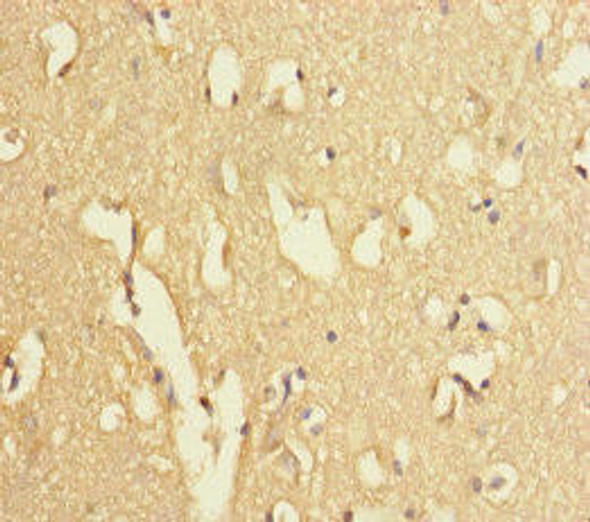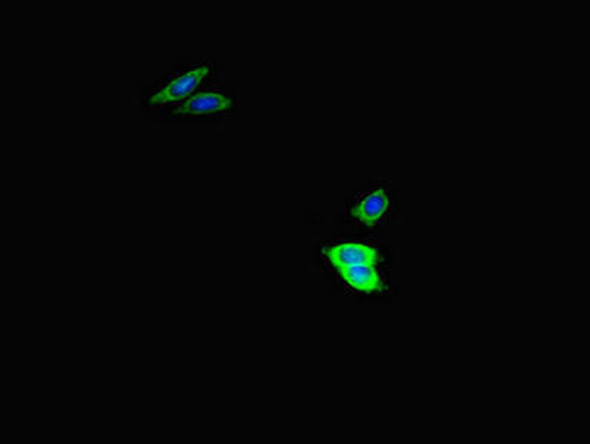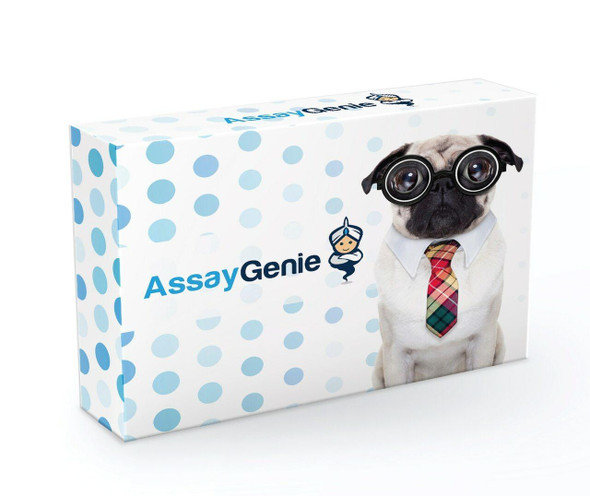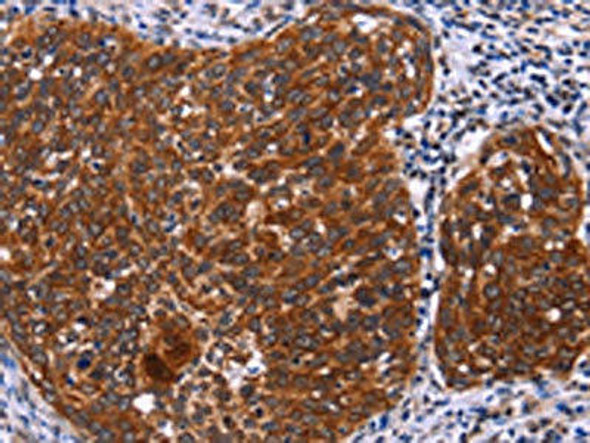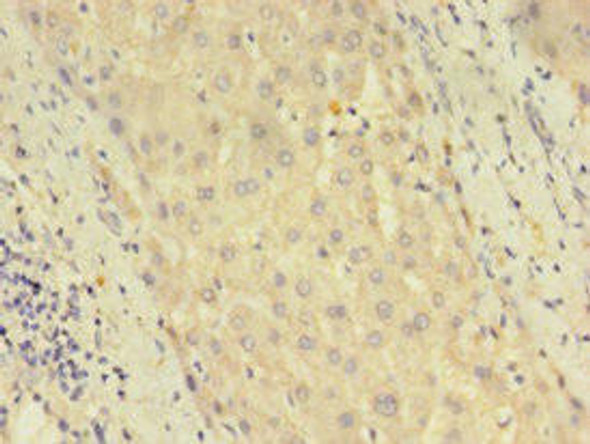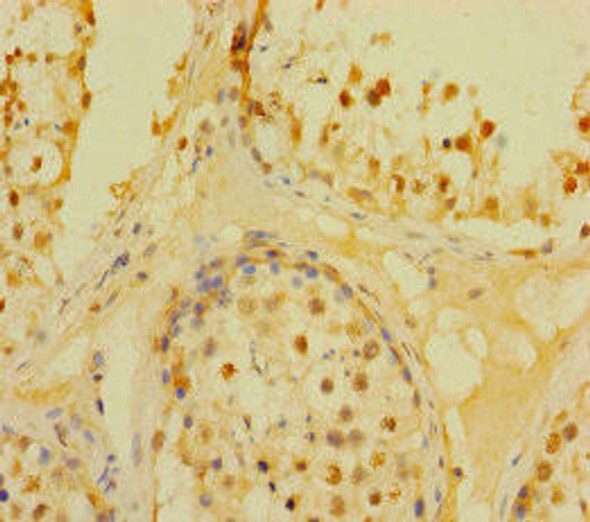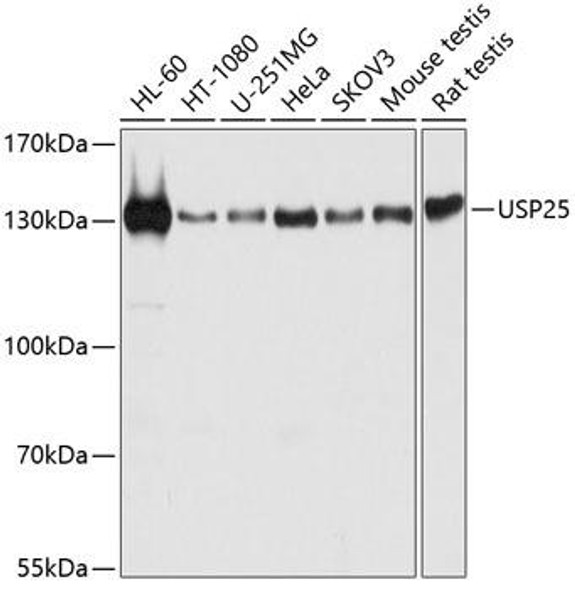USP2 Antibody (PACO15604)
- SKU:
- PACO15604
- Product Type:
- Antibody
- Reactivity:
- Human
- Mouse
- Rat
- Host Species:
- Rabbit
- Isotype:
- IgG
- Applications:
- ELISA
- IHC
- Antibody Type:
- Polyclonal Antibody
- Conjugation:
- Unconjugated
Description
USP2 Antibody (PACO15604)
The USP2 Polyclonal Antibody (PAC015604) is a valuable tool for researchers studying USP2, a protein involved in various cellular processes such as signal transduction, cell cycle regulation, and DNA repair. This antibody is raised in rabbits and has been validated for use in Western blot applications with human samples. By specifically binding to USP2, researchers can confidently detect and analyze the protein in a variety of cell types.USP2 is known to play a role in the regulation of protein stability and turnover, making it a promising target for studies related to cancer biology, neurodegenerative diseases, and metabolic disorders.
Understanding the function and regulation of USP2 can provide valuable insights into disease mechanisms and potential therapeutic strategies targeting this protein.Overall, the USP2 Polyclonal Antibody is a reliable reagent for investigating the biological functions of USP2 and its implications in various disease contexts. Its high reactivity and specificity make it an essential tool for researchers in the fields of molecular biology, biochemistry, and drug discovery.
| Antibody Name: | USP2 Antibody (PACO15604) |
| Antibody SKU: | PACO15604 |
| Size: | 50ul |
| Host Species: | Rabbit |
| Tested Applications: | ELISA, IHC |
| Recommended Dilutions: | ELISA:1:1000-1:2000, IHC:1:25-1:100 |
| Species Reactivity: | Human, Mouse, Rat |
| Immunogen: | Fusion protein of human USP2 |
| Form: | Liquid |
| Storage Buffer: | -20°C, pH7.4 PBS, 0.05% NaN3, 40% Glycerol |
| Purification Method: | Antigen affinity purification |
| Clonality: | Polyclonal |
| Isotype: | IgG |
| Conjugate: | Non-conjugated |
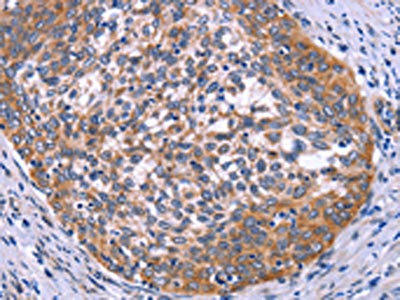 | The image on the left is immunohistochemistry of paraffin-embedded Human cervical cancer tissue using PACO15604(USP2 Antibody) at dilution 1/30, on the right is treated with fusion protein. (Original magnification: x200). |
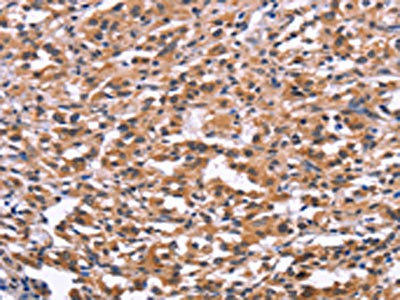 | The image on the left is immunohistochemistry of paraffin-embedded Human thyroid cancer tissue using PACO15604(USP2 Antibody) at dilution 1/30, on the right is treated with fusion protein. (Original magnification: x200). |
| Background: | This gene encodes a member of the family of de-ubiquitinating enzymes, which belongs to the peptidase C19 superfamily. The encoded protein is a ubiquitin-specific protease which is required for TNF-α (tumor necrosis factor alpha) -induced NF-kB (nuclear factor kB) signaling. This protein deubiquitinates polyubiquitinated target proteins such as fatty acid, synthase, murine double minute 2 (MDM2), MDM4/MDMX and cyclin D1. MDM2 and MDM4 are negative regulators of the p53 tumor suppressor and cyclin D1 is required for cell cycle G1/S transition. Multiple alternatively spliced transcript variants encoding different isoforms have been identified. |
| Synonyms: | ubiquitin specific peptidase 2 |
| UniProt Protein Function: | USP2: Hydrolase that deubiquitinates polyubiquitinated target proteins such as MDM2, MDM4 and CCND1. Isoform 1 and isoform 4 possess both ubiquitin-specific peptidase and isopeptidase activities. Deubiquitinates MDM2 without reversing MDM2-mediated p53/TP53 ubiquitination and thus indirectly promotes p53/TP53 degradation and limits p53 activity. Has no deubiquitinase activity against p53/TP53. Prevents MDM2-mediated degradation of MDM4. Plays a role in the G1/S cell-cycle progression in normal and cancer cells. Plays a role in the regulation of myogenic differentiation of embryonic muscle cells. Homooligomer. Found in trimeric complex with MDM2 and MDM4 and UPB2. Interacts with CCND1; the interaction is direct and promotes its stabilization by antagonizing ubiquitin-dependent degradation. Interacts (via N-terminus and C- terminus) with MDM2. Interacts with MDM4. Down-regulated by cisplatin. Expressed in mesangial cells of the kidney and in different types of glomerulonephritides. Cleavage is inhibited by ubiquitin in a dosage- dependent manner. Cleavage is blocked by ubiquitin aldehyde. Belongs to the peptidase C19 family. USP2 subfamily. 4 isoforms of the human protein are produced by alternative splicing. |
| UniProt Protein Details: | Protein type:Ubiquitin-specific protease; Protease; EC 3.4.19.12 Chromosomal Location of Human Ortholog: 11q23.3 Cellular Component: centrosome; perinuclear region of cytoplasm; cytoplasm; cell cortex; nucleus Molecular Function:identical protein binding; protein binding; cyclin binding; ubiquitin protein ligase binding; metal ion binding; cysteine-type endopeptidase activity; ubiquitin-specific protease activity Biological Process: proteasomal ubiquitin-dependent protein catabolic process; negative regulation of skeletal muscle development; muscle development; protein deubiquitination; protein stabilization; positive regulation of skeletal muscle development; negative regulation of transcription from RNA polymerase II promoter; positive regulation of mitotic cell cycle; cell cycle; circadian behavior; entrainment of circadian clock by photoperiod; locomotor rhythm; circadian regulation of gene expression |
| NCBI Summary: | This gene encodes a member of the family of de-ubiquitinating enzymes, which belongs to the peptidase C19 superfamily. The encoded protein is a ubiquitin-specific protease which is required for TNF-alpha (tumor necrosis factor alpha) -induced NF-kB (nuclear factor kB) signaling. This protein deubiquitinates polyubiquitinated target proteins such as fatty acid synthase, murine double minute 2 (MDM2), MDM4/MDMX and cyclin D1. MDM2 and MDM4 are negative regulators of the p53 tumor suppressor and cyclin D1 is required for cell cycle G1/S transition. Multiple alternatively spliced transcript variants encoding different isoforms have been identified. [provided by RefSeq, Aug 2011] |
| UniProt Code: | O75604 |
| NCBI GenInfo Identifier: | 20141855 |
| NCBI Gene ID: | 9099 |
| NCBI Accession: | O75604.2 |
| UniProt Secondary Accession: | O75604,Q8IUM2, Q8IW04, Q96MB9, Q9BQ21, B0YJB8, E9PPM2 |
| UniProt Related Accession: | O75604 |
| Molecular Weight: | 605 |
| NCBI Full Name: | Ubiquitin carboxyl-terminal hydrolase 2 |
| NCBI Synonym Full Names: | ubiquitin specific peptidase 2 |
| NCBI Official Symbol: | USP2 |
| NCBI Official Synonym Symbols: | USP9; UBP41 |
| NCBI Protein Information: | ubiquitin carboxyl-terminal hydrolase 2; ubiquitin thioesterase 2; deubiquitinating enzyme 2; ubiquitin specific protease 9; ubiquitin specific protease 12; 41 kDa ubiquitin-specific protease; ubiquitin-specific-processing protease 2 |
| UniProt Protein Name: | Ubiquitin carboxyl-terminal hydrolase 2 |
| UniProt Synonym Protein Names: | 41 kDa ubiquitin-specific protease; Deubiquitinating enzyme 2; Ubiquitin thioesterase 2; Ubiquitin-specific-processing protease 2 |
| Protein Family: | Protein |
| UniProt Gene Name: | USP2 |
| UniProt Entry Name: | UBP2_HUMAN |





